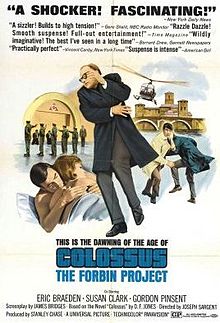
COLOSSUS: THE FORBIN PROJECT
US, 1969, 99 minutes, Colour.
Eric Braeden, Susan Clark.
Directed by Joseph Sargent.
The Forbin Project was not a big budget film and received more critical acclaim than the producers expected. It is a competent science-fiction film, technically well-made, more plausibly presented than most, and raises a number of important issues.
Based on a novel called Colossus, it shows what happens when the greatest computer system ever is built; it is intelligent beyond individual human capacities and indestructible, and has been built for the protection of the U.S. It does its Job efficiently, but enters into league with its equal, a Russian computer. Colossus begins to control the human race, outwitting and frightening it and then punishing it by nuclear destruction. Finally, the machine takes control of the entire life of its maker, orders a voice to be made, and then proceeds to elaborate more highly-involved programmes for people to carry out. Colossus is better at controlling people than Hal in 2001: A Space Odyssey and creates a 1984 situation where Big Brother is not another man using a machine, but an impersonal, emotionless, brilliant machine. The Forbin Project is an entertaining, but frightening, warning.
1. What was the point of building up such an optimistic start to the film? How did it affect what was to come?
2. What was the point of making the U.S. president so much like John F, Kennedy?
3. The Press Conference, the celebration parties - what picture of normal human beings did they show us? How did these sequences affect what was to come?
4. Is it really possible for humans to build such a clever and indestructible machine like Colossus?
5. Why was it alarming when Colossus went into league with the Russian system? How did the machines communicate? Why couldn’t people get control of them at this stage?
6. What kind of personality did the Colossus have? How did it speak? How did the scientists speak to it and regard it? What impression did the machine make when it used the cameras on Doctor Forbin? When it finally had a voice? What impression did the voice have on you?
7. What kind of power (and threats) did Colossus have over the human race
- of the nuclear threats,
- the ordering of the death of the Russian scientist,
- the ability to work out the plan to foil it,
- the dictating of plans for a voice and for other systems,
- the supervision of Dr Forbin's private self and life?
8. What did you think of the strategy of Dr Forbin's plan, to outmanoeuvre Colossus? Of the morality of pretending a liaison with his assistant?
9. Dr. Forbin says at the end that he will not serve the machine. Has he any choice? What did the end of the film mean?
10. What were the film's points about: human skill in making machines; the machine's control; the lessening of human dignity when humans are controlled by machine; nuclear destruction; totalitarianism; 1984 theme?
11. Even though the film was science-fiction, how real was it?